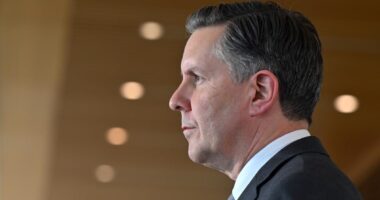As the flag of a British workers union flapped behind him on a blustery June morning, Liam Kehoe was on strike with colleagues outside Royal Liverpool University Hospital, demanding better pay for porters, cleaners and catering staff. Their wages have failed to keep up with the surge in the cost of living, and many said they were living paycheck to paycheck.
Kehoe, 26, serves food in the hospital. On Thursday, the day of Britain’s general election, he plans to vote for the center-left Labour Party because of the economic situation and the crumbling state of the National Health Service, he said. Thinking of the life that his parents built on salaries earned as a nurse and a truck driver, Kehoe said that young people have been left with far worse prospects after 14 years of a Conservative-led government. “If you go back 30 years ago, houses were a bit more affordable, life was a little bit easier,” he said. “Nowadays, it’s like you can’t afford anything.”
Polls suggest more than half of voters under 35 plan to vote for Labour on Thursday, compared with 27% of voters over 65. While the gap between young and old in politics is not new, the extent of the split in Britain in recent years is exceptional, with support for the governing Conservative Party dropping sharply in all but the oldest age group, according to recent polls. Before 2019, the major factor in whether people voted Conservative or Labour was income. More recently, “age has replaced class as the defining way in which people vote,” said Molly Broome, an economist with the Resolution Foundation, a British research institute.
Also read | Who is Keir Starmer, the Labour leader favored to win Britain’s July 4 election?
The northern English city of Liverpool has long been a Labour stronghold with a proud working-class tradition. Many young people said their allegiance to the center-left party has been strengthened by a sense that their needs have been ignored by the Conservatives. Kehoe and his girlfriend are trying to buy a home. “The housing market is on its knees,” he said. “The whole country is falling to bits because this government is in it for them and not in it for us. They don’t care about us, the little guys at the bottom.” Others expressed broader discontent at a political system that they said did not account for their needs. Some young people said they would not vote at all, while others would cast ballots for third-party candidates who had little chance of winning more than a few seats but whose ethos was more aligned with theirs.
Much of the political messaging from Britain’s two main parties has focused on the priorities of older generations, experts said, since they make up a large proportion of the electorate, partly because of population shifts. They are also more likely to vote: Some 96% of people over 65 are registered to vote, compared with 60% of 18- to 19-year-olds and 67% of those 20 to 44, according to a 2023 electoral commission report. Politicians have safeguarded some policies that support older people, even as younger generations face worsening standards of living. The pension “triple lock,” for instance, introduced by the Conservative-led government in 2011, ensures that the state retirement income — similar to Social Security in the United States rises each year by the highest of earnings growth, inflation or 2.5%.
While age remains the major dividing factor in support for the two main political parties, there are also divisions within the younger generation, Broome said. Labour has had a positive swing in polls across all generations, except among millennials who did not graduate from university and those who do not own a home. “It’s not the fact that they are more likely to vote Conservative; it’s the fact that they are less likely to vote at all,” Broome said.
Owen Burrows, 21, a porter at the Liverpool hospital, does not plan to vote, he said, despite it being the first general election for which he is eligible. “I just can’t say there is anyone I actually agree with, so I really wouldn’t be inclined to vote,” he said. He remembers being “baffled” in 2016 when the country voted to withdraw from the European Union. “With the state the country is in now, and with the whole Brexit situation, it just feels like it’s gone completely wrong,” he said.
Also read | Crisis in the UK’s NHS shows why Conservatives are struggling after 14 years in power
Brexit looms large for many. In Liverpool’s Baltic Triangle, a former warehouse district with a thriving creative scene, young men skateboarded in the evening light. The rhythmic roll of their skateboard wheels echoed off brightly painted walls. One of the skateboarders, Joe McKenna, 26, was the first in his family to go to university. In the Brexit referendum, his first vote, he opted to remain, while his parents voted to leave. “I





